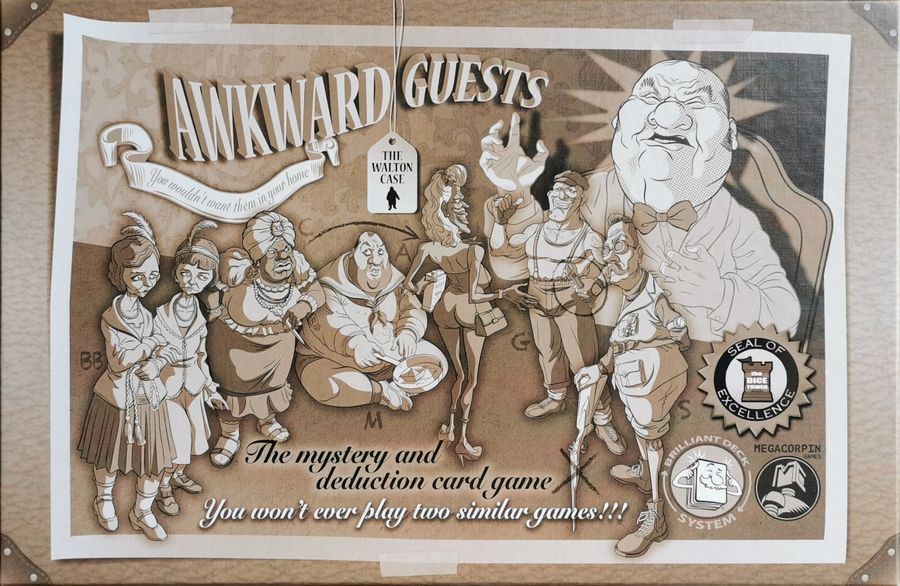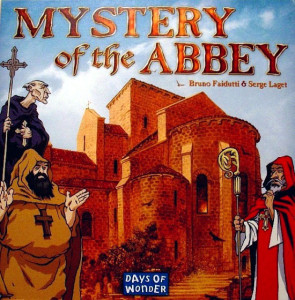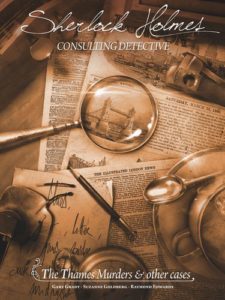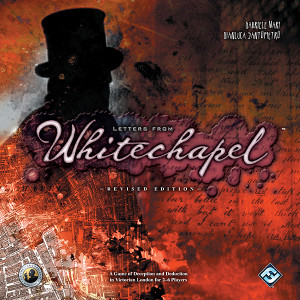- Learning time
- 30 minutes
- First play time
- 120 minutes
Awkward Guests
Designed by: Ron Gonzalo García
Awkward Guests is a deduction game where the players are trying to solve a murder in a country mansion.
Mr Walton has been murdered, and there are six potential suspects who were all present in the manor when he died. You must now deduce who committed the crime, the motive, weapon, and -in the advanced game at least – whether there was an accomplice. Not only that, but what the accomplice’s motive was!
As the most uncooperative detectives ever, players discover clues dealt to them from a deck of cards, and as the game proceeds share this knowledge with certain other players: clues have a currency of their own, ranging from the vaguely-helpful (1) up to decisively instructive (4) and on your turn, you can ask the other players for information about two specific elements of the case – a person or persons, a room or rooms in the house. Players then offer clue cards for trade with you, and thus everyone is slowly gathering more and more information with which to eliminate motives, weapons and suspects. After everyone has had a turn trading, there is the option to make an accusation, and it’s here that Awkward Guests diverges into two distinct versions – if you use the attendant app, the guesser simply learns whether they were right or not, and then – if they’re wrong – play continues. Playing without the app means even when wrong, they learn the true culprit/motive/weapon etc and cannot continue playing!
Because of the canny way Awkward Guests has been devised, there are literally thousands of different cases to play – the only catch is that for each game the clue deck needs to be carefully prepared so it fits the solution to that particular case, and so every game demands a fair degree of preparation.
Joe says
I've only played this once, and it was a fairly exhausting affair. But that was with, I think, seven players, at the end of a weekend of gaming, and I wouldn't want to write it off based on a single play. If you're a fan of Cluedo style games it certainly clever, and with, as a Sam say, four or five willing participants, could be a lot of fun.
The guru's verdict
-
Take That!
Take That!
Very little, although you can sometimes find yourself left out of trades, or receiving information you've already seen.
-
Fidget Factor!
Fidget Factor!
Frequent, but not protracted. Each player needs time to tick off clues they've received.
-
Brain Burn!
Brain Burn!
Low on the easy cases, low to moderate on the harder ones. Ultimately it's about what you know, but there's certainly an element of figuring out how some clues interconnect as well.
-
Again Again!
Again Again!
Thanks to the variables of culprit/weapon/motive/accomplice, there are literally thousands of cases to be solved, albeit it's always the same poor victim and repeat offenders.














Sam says
Awkward Guests is really a rather clever design, a modern-day iteration of Cluedo that shuns the plodding around and cuts straight to the real deal - the currency of information rather than dice-rolls. Although I'm not a huge fan of apps in board games, it does allow for a wrongful accusation not ending the accuser's involvement. That said, though, the more players you have, the more down-time there is, and it is possible to feel like you're treading water when you keep receiving back information you traded away earlier. That can make you feel more like a spectator to events rather than an active participant, so there are caveats to Awkward Guests. But playing with fewer players (four at most, I would say) can counter this to an extent.